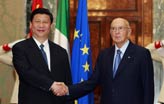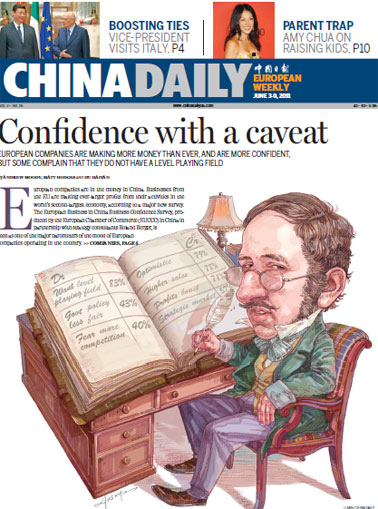Op-Ed Contributors
Time for EU to turn the tide in its favor
Updated: 2011-06-03 10:52
By Zhang Jian (China Daily European Weekly)
In addition, at the operational level, A Partnership for Democracy and Shared Prosperity with the Southern Mediterranean is incentive-based. For those countries that partake in constitutional reform, judicial reform and conduct fair and open elections, the EU will provide more financial assistance, trade concessions and further relaxation of visas.
Second, the EU will intensify its efforts to stabilize Palestinian-Israeli relations and Arab-Israeli relations to avoid an even greater instability and military conflict in the Middle East and North Africa regions. The Palestinian-Israeli peace issue is not only to the stability of Europe's long-neglected backyard, but also related to the internal security of the EU.
The United Kingdom, in 1917, launched The Balfour Declaration. The document allowed large numbers of European Jews to immigrate to Palestine and established the Trust Territory of the State of Israel. Since then, there has been a long-standing conflict between Palestine and Israel.
The Middle East turbulence has affected the peace talks between the two states. Palestinian-Israeli peace diplomacy has been one of the key priorities in Europe. The Palestinian-Israeli conflict is a long-term insecurity and instability factor for the EU. The conflict has also created a breeding "base" in the Middle East and is the main source of terrorist organizations.
The EU's position toward the Palestinian-Israeli peace issue is not entirely consistent with the position of the United States. The EU tends to take care of the concerns of the Palestinians, encouraging Egypt and other countries to support Palestinian-Israeli peace talks through economic aid and preferential trade, exerting some pressure on Israel.
After the recent changes in the Middle East, the new governments of Egypt and other countries are unlikely to support Israeli-Palestinian peace talks, which will encounter new difficulties.
If the confrontation with Israel and Arab countries increases, possubly leading to the outbreak of a new military conflict, which will further stimulate anti-Western sentiment in the Islamic world, the EU geopolitical security and internal stability will suffer a lot.
According to an analysis by the Pew Research Center released in January, the EU's Muslim population reached 44.1 million in 2010, which accounts for 6 percent of the total European population. This figure is expected to increase in 2030 to 58 million, or 8 percent of the total European population.
Third, the EU will be more concerned about the socio-economic development in the Middle East and North African countries. Those areas provided the EU with a continuing influx of illegal immigrants and the proliferation of extremism and terrorism. These are the fundamental sources of EU's security risks.
After analysis and reflection, the EU began to realize that its input in boosting the economic development was not enough and there is a need for policy adjustments.
Of course, the EU recognizes that the implementation of the policy adjustment is unlikely to happen overnight. First, there is a lack of consensus within the EU member countries. Because of historical, geographical and emotional reasons, the southern countries in the EU, such as France, Italy, Spain and others, proposed that the EU put more energy and money into North Africa and the Middle East, while the Central and Eastern European countries and the Nordic countries did not agree.
Second, there is a wide gap between the EU's ambitions and its actual paying ability. Since the outbreak of the EU's sovereign debt crisis in the past two years, more member countries have tightened fiscal budgets to reduce the deficit.
The Middle East and the North Africa regions are major concerns for the EU. In the short term, change in these regions poses more challenges than opportunities to the EU; in the long term, it also offers an opportunity for the EU - to enhance its own values in the region.
The author is a scholar with the China Institute for Contemporary International Relations.
E-paper

Harbin-ger of change
Old industrial center looks to innovation to move up the value chain
Chemical attraction
The reel Mao
Improving app-iness
Specials

Vice-President visits Italy
The visit is expected to lend new impetus to Sino-Italian relations.

Birthday a new 'starting point'
China's national English language newspaper aims for a top-notch international all-media group.

Sky is the limit
Chinese tycoon conjures up green dreams in Europe with solar panels
